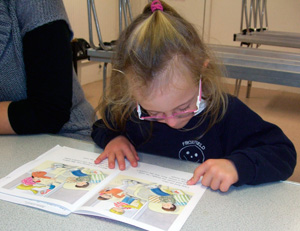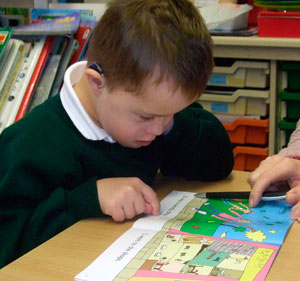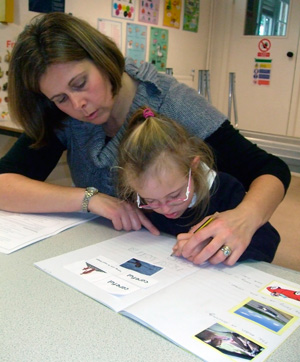Feedback
In addition to our quantitative outcome measures, we surveyed and consulted Teaching Assistants and parents during the study to understand their views of the intervention.

Survey after 10 weeks of intervention
We asked the Teaching Assistants in the initial intervention group (1) to complete a questionnaire after 10 weeks of intervention delivery (half way into phase A).
We received feedback from 30 Teaching Assistants. They reported that they enjoyed delivering the intervention (average rating of 5.8 on a scale of 1 (not at all) to 7 (very much)) and that they were satisfied with the content of the intervention (5.7).
The Teaching Assistants reported that they were more confident after 10 weeks of delivering intervention (average rating of 5.8) than they were at the beginning of the project (average rating of 3.7). They also felt more competent after 10 weeks (5.9) compared to at the beginning (4.0).
The Teaching Assistants reported that participating in the intervention led to increased confidence (5.6), improved skills and expertise (5.7), increased self-esteem (5.1) and greater job satisfaction (5.7).
When asked to rate the impact of the intervention on the child's ability on a scale of 1 (declined) to 7 (vast improvement), the Teaching Assistants reported large positive impacts on reading ability (6.1), enjoyment of books and reading (5.8), spoken language skills (5.7) and speech clarity (5.6).
Feedback during 'refresher' training
After 10-weeks of delivering intervention, the Teaching Assistants were asked to attend a refresher training day. As part of this, we asked Teaching Assistants to share some of the positives and challenges they had experienced in delivering the program. These have been grouped into themes below, focusing first on the positives and then on some of the challenges involved in delivering the program., and how the research team responded to these. We have illustrated these with specific quotes where possible.


Positives
Routine, structure and direction
Teaching Assistants felt that the teaching program. offered a clear structure and direction to follow, and this was helpful in guiding their teaching and helping them to keep track of the work they had been doing:
- "It (the intervention) helps so much to structure the day, makes you feel as if you have achieved something every day and the benefits to the child makes it all worthwhile"
- "It has been an absolute godsend"
Others reported that particular aspects of the teaching program. were well structured and provided a clear focus for the day:
- "Progression in books is well structured"
- "The words in the language strand provide focus for the whole day"
Improved attention and behavior
Teaching Assistants reported that many children were able to sustain attention for longer periods as a result of the structure and content of the program. This also seemed to have a positive impact on behavior Some Teaching Assistants had noticed this transfer to other teaching and school activities beyond the intervention sessions which had had a positive impact on school inclusion:
- "Improvements in skills and behavior led to greater social inclusion in class and at playtime".
Child's progress
Many Teaching Assistants were also very positive about the progress they had seen the child make:
- "Nice to see some have remembered more than expected over the summer". "I think this (the intervention) has made the biggest difference to X out of everything we have done over the last two and a half years"
- "The writing has suddenly taken off and most of these words I just had to tell her the letter and she wrote unaided! The ones she is not so confident on she asks for help which is merely me touching her hand. Am so proud of her and the reading is still progressing"
- "Go for it, it's really worthwhile and seeing the results is fantastic"
- "....X is coming on leaps and bounds with his reading. Remember how we'd spent two months on 'The New Pet', well he is going through two books a week at the moment. It's all very good news on this front"
- "She did a really FAB thing last week. I gave her 'at' as a start point and then we added the first sound, c, b, h etc. and she sounded out and blended every one, we were GOBSMACKED. She was SO pleased with herself too."
- "He is reading 'Cat in the Hat' at the moment and his language is improving all the time."
Many Teaching Assistants also reported that other staff in school had noticed the gains children were making, including improvements in reading, language and speech:
- "Staff amazed at X's improvement and have had several people show interest in the intervention"
- "Everyone is saying he talks a lot more now"
- "It has had a positive impact on X's language and reading skills; many people have commented on how much X's speech has improved and that they can now understand him"
Teaching Assistants also reported positive feedback from children's parents about progress:
- "X still doing great with the reading and retained it all over the Xmas break. Mum and Dad did their best to keep it going; they are thrilled with her progress."

Enjoyment and enthusiasm
The feedback clearly reflected enjoyment of both the child and the Teaching Assistant in the teaching program. Children clearly enjoyed particular aspects of the Reading Strand:
- "The reading is working really well - X enjoys being able to read the easy books and is very excited when we move on to a new book"
- "Reading works well - easy books give confidence as they can read them"
- "The first thing X mentioned on her return to school was 'new books!'. We read some of the books that she has already mastered and she had retained them and was able to recall some of the stories."
and the Language Strand:
- "the child loves the physical activities"
- "Love making topic books and these helped progress with handwriting"
- "Love language and making topic books"
- "X enjoys the wide variety of different activities"
- "Great fun - photos and involving her in the aspects of the 'word of the day' - it was fun"
Support from school
Some Teaching Assistants reported that communication had been good with school and that they had been supported with time to prepare and deliver sessions. Teaching Assistants also reported that it was useful to involve the class teacher in the teaching program. e.g. by having the sight words/vocabulary targets up in the classroom.
Children's sense of achievement and progress
Many Teaching Assistants reported that the children were really proud of their achievements, and that they enjoyed having a record of what they have done and sharing this work with others in the class.
Individualized program.
Many Teaching Assistants reported that the activities are at an appropriate level for the children, in that they are challenging yet achievable. Teaching Assistants also noted how important it is to be able to tailor the teaching program. to the child's particular needs and abilities:
- "Fantastic to be provided with books that are specifically targeted at children's exact level of ability"
Challenges
Finding time to deliver the program.
Some Teaching Assistants commented on difficulties fitting the teaching into the school day. In particular, it could be difficult to find a suitable time to take the child out of the class:
- "Time table does not always allow for intervention. Thursday - literacy/ICT; X always objects strongly if class go to ICT suite and he can't. Friday - no literacy; history instead."
- "Other activities in school getting in the way of intervention delivery e.g. sports day, etc. - can be difficult to fit in.
Other Teaching Assistants noted that it could be difficult to fit the teaching program. in to the 40-minute (or 2 x 20 minute) sessions: "The 20 minutes can be a bit of a rush and do not allow TA to give child enough thinking time."
Child's ability to participate
Some Teaching Assistants commented on various factors which they felt impacted on the child's ability to participate in the teaching program. Behavior and health problems were noted as impacting on the ability to participate, as were particular difficulties with expressive language skills "Difficulties with speech sometimes make it difficult to know whether child is getting the words (both in language work and in reading)"
Letters, Sounds and phonology
Many Teaching Assistants reported that they found this component the most difficult to understand and to deliver:
- "Phonics - struggle with ideas and knowing what steps to take next"
- "Phonics - not enough ideas to put into practice originally"
- "Phonics - I don't have enough experience in delivering it."
Keeping motivated
Some Teaching Assistants reported that they found it difficult to keep motivated to continue with the program.
Generalizing learning
Application of knowledge to different learning situations is really important and some Teaching Assistants reported finding it difficult to support and check this.
Individualizing the program
Some Teaching Assistants found it difficult to individualist the program. and make it a suitable challenge for children.
Lack of support
Not all Teaching Assistants felt well-supported by parents and this was noted in some cases to be a challenge. Also, some Teaching Assistants reported a lack of school support, both with allowing preparation time and providing appropriate space and resources, and interest/support with intervention content and delivery:
- "A lot of prep - we only had a day to prep for starting after the holidays"
- "I'm the only one involved and no one else even knows what I do - just left to get on with it! This is fine but would be nice for them to show an interest"
- "Can feel left alone for managing behavior"
- "Important that class teacher is consistent with expectations of behavior"
Individualized program
Many Teaching Assistants reported that the activities are at an appropriate level for the children, in that they are challenging yet achievable. Teaching Assistants also noted how important it is to be able to tailor the teaching program. to the child's particular needs and abilities:
- "Fantastic to be provided with books that are specifically targeted at children's exact level of ability"
< Findings | RLI Home Page | Data tables >
Further information
For further information, please select from the following:



